制定一个周计划的英文
- 格式:docx
- 大小:23.72 KB
- 文档页数:3
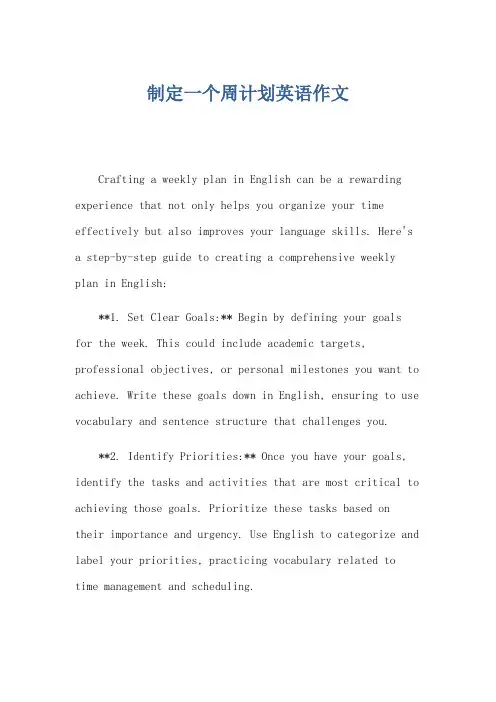
制定一个周计划英语作文Crafting a weekly plan in English can be a rewarding experience that not only helps you organize your time effectively but also improves your language skills. Here's a step-by-step guide to creating a comprehensive weekly plan in English:**1. Set Clear Goals:** Begin by defining your goalsfor the week. This could include academic targets, professional objectives, or personal milestones you want to achieve. Write these goals down in English, ensuring to use vocabulary and sentence structure that challenges you.**2. Identify Priorities:** Once you have your goals, identify the tasks and activities that are most critical to achieving those goals. Prioritize these tasks based ontheir importance and urgency. Use English to categorize and label your priorities, practicing vocabulary related to time management and scheduling.**3. Create a Timeline:** Allocate specific days and times for each task or activity on your priority list. This timeline should be realistic and achievable, allowing for enough time to complete each task effectively. Use English to describe the timeline, incorporating vocabulary for days of the week, times of day, and durations.**4. Plan for Unexpected Events:** Recognize that life doesn't always go according to plan. Allocate some buffer time in your schedule to account for unexpected events or emergencies. Practice using English to express contingency plans and flexibility in scheduling.**5. Review and Refine:** As the week progresses, review your plan and make adjustments as needed. This could involve reallocating time, prioritizing different tasks, or even修订(revising)your goals based on new information or circumstances. Use English to describe these changes, focusing on vocabulary and grammar related to adaptability and decision-making.**6. Reflect and Learn:** At the end of the week, take some time to reflect on your progress and accomplishments. Identify what worked well and what could be improved inyour planning process. Use English to record your reflections and lessons learned, focusing on vocabulary and expressions that help you articulate your thoughts and experiences.By following these steps and practicing your English throughout the process, you can create a weekly plan that not only helps you achieve your goals but also enhances your language skills. Remember to stay positive, stay focused, and embrace the challenge of using English to express your thoughts and ideas.**如何制定一个英文周计划**制定一个英文周计划不仅可以帮助你有效地组织时间,还可以提高你的语言技能。
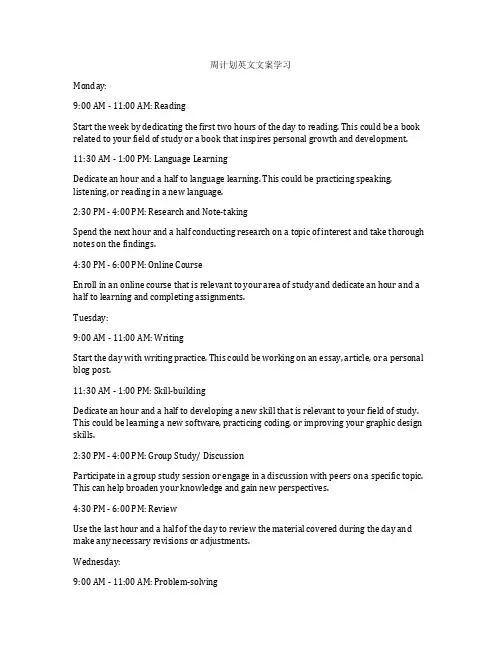
周计划英文文案学习Monday:9:00 AM - 11:00 AM: ReadingStart the week by dedicating the first two hours of the day to reading. This could be a book related to your field of study or a book that inspires personal growth and development. 11:30 AM - 1:00 PM: Language LearningDedicate an hour and a half to language learning. This could be practicing speaking, listening, or reading in a new language.2:30 PM - 4:00 PM: Research and Note-takingSpend the next hour and a half conducting research on a topic of interest and take thorough notes on the findings.4:30 PM - 6:00 PM: Online CourseEnroll in an online course that is relevant to your area of study and dedicate an hour and a half to learning and completing assignments.Tuesday:9:00 AM - 11:00 AM: WritingStart the day with writing practice. This could be working on an essay, article, or a personal blog post.11:30 AM - 1:00 PM: Skill-buildingDedicate an hour and a half to developing a new skill that is relevant to your field of study. This could be learning a new software, practicing coding, or improving your graphic design skills.2:30 PM - 4:00 PM: Group Study/ DiscussionParticipate in a group study session or engage in a discussion with peers on a specific topic. This can help broaden your knowledge and gain new perspectives.4:30 PM - 6:00 PM: ReviewUse the last hour and a half of the day to review the material covered during the day and make any necessary revisions or adjustments.Wednesday:9:00 AM - 11:00 AM: Problem-solvingDedicate the first two hours of the day to solving problems related to your field of study. This could be working on math problems, case studies, or logic puzzles.11:30 AM - 1:00 PM: Hands-on PracticeEngage in hands-on practice by applying the theoretical knowledge you have gained. This could be conducting experiments, working on a project, or practicing a musical instrument. 2:30 PM - 4:00 PM: Guest Lecture/ SeminarAttend a guest lecture or seminar related to your area of study to gain new insights and learn from experts in the field.4:30 PM - 6:00 PM: ReflectionSpend the last hour and a half reflecting on your learning and experiences throughout the day. Identify any areas of improvement and set goals for the upcoming days.Thursday:9:00 AM - 11:00 AM: Review and Practice TestsSpend the first two hours of the day reviewing previous material and taking practice tests to gauge your understanding and retention of the content.11:30 AM - 1:00 PM: Creative ExpressionDedicate an hour and a half to creative expression. This could be drawing, painting, writing poetry, or any other form of artistic expression.2:30 PM - 4:00 PM: Mentorship/ NetworkingConnect with a mentor or network with professionals in your field to gain valuable insights and advice.4:30 PM - 6:00 PM: Physical ActivityEngage in physical activity to refresh your mind and body. This could be going for a run, practicing yoga, or playing a sport.Friday:9:00 AM - 11:00 AM: Presentation PreparationSpend the first two hours of the day preparing a presentation on a topic of interest. Practice delivering the presentation to improve your public speaking skills.11:30 AM - 1:00 PM: Real-world ApplicationDedicate an hour and a half to applying your knowledge in a real-world scenario. This could be volunteering, interning, or freelancing in your field of study.2:30 PM - 4:00 PM: Peer Review/ FeedbackEngage in a peer review session or seek feedback from peers on a project or assignment. 4:30 PM - 6:00 PM: Goal SettingUse the last hour and a half of the day to review your weekly accomplishments, set new goals for the upcoming week, and create a plan of action.Saturday and Sunday:Use the weekend to relax, rejuvenate, and engage in activities that bring joy and fulfillment. This could include spending time with family and friends, pursuing hobbies, or exploring new places.By following this weekly study plan, you can ensure a balanced and effective approach to learning and personal growth. Remember to stay committed and consistent in your efforts, and you will see a positive impact on your academic and personal development.。
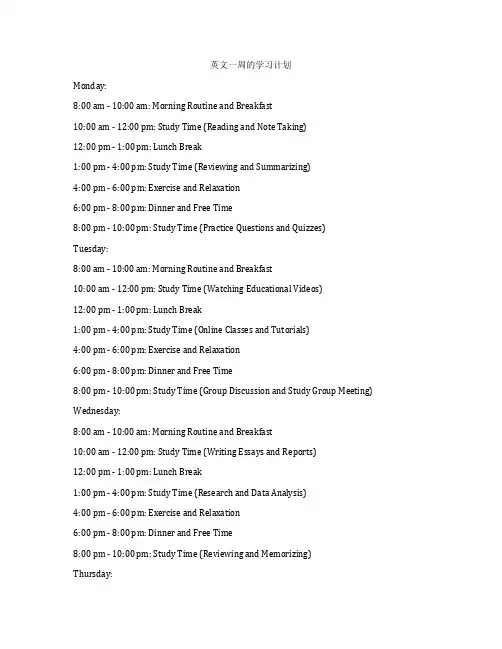
英文一周的学习计划Monday:8:00 am - 10:00 am: Morning Routine and Breakfast10:00 am - 12:00 pm: Study Time (Reading and Note Taking)12:00 pm - 1:00 pm: Lunch Break1:00 pm - 4:00 pm: Study Time (Reviewing and Summarizing)4:00 pm - 6:00 pm: Exercise and Relaxation6:00 pm - 8:00 pm: Dinner and Free Time8:00 pm - 10:00 pm: Study Time (Practice Questions and Quizzes) Tuesday:8:00 am - 10:00 am: Morning Routine and Breakfast10:00 am - 12:00 pm: Study Time (Watching Educational Videos)12:00 pm - 1:00 pm: Lunch Break1:00 pm - 4:00 pm: Study Time (Online Classes and Tutorials)4:00 pm - 6:00 pm: Exercise and Relaxation6:00 pm - 8:00 pm: Dinner and Free Time8:00 pm - 10:00 pm: Study Time (Group Discussion and Study Group Meeting) Wednesday:8:00 am - 10:00 am: Morning Routine and Breakfast10:00 am - 12:00 pm: Study Time (Writing Essays and Reports)12:00 pm - 1:00 pm: Lunch Break1:00 pm - 4:00 pm: Study Time (Research and Data Analysis)4:00 pm - 6:00 pm: Exercise and Relaxation6:00 pm - 8:00 pm: Dinner and Free Time8:00 pm - 10:00 pm: Study Time (Reviewing and Memorizing)Thursday:8:00 am - 10:00 am: Morning Routine and Breakfast10:00 am - 12:00 pm: Study Time (Practicing Skills and Techniques) 12:00 pm - 1:00 pm: Lunch Break1:00 pm - 4:00 pm: Study Time (Mock Tests and Exams)4:00 pm - 6:00 pm: Exercise and Relaxation6:00 pm - 8:00 pm: Dinner and Free Time8:00 pm - 10:00 pm: Study Time (Feedback and Improvement) Friday:8:00 am - 10:00 am: Morning Routine and Breakfast10:00 am - 12:00 pm: Study Time (Reviewing and Reinforcement) 12:00 pm - 1:00 pm: Lunch Break1:00 pm - 4:00 pm: Study Time (Creative Projects and Presentations) 4:00 pm - 6:00 pm: Exercise and Relaxation6:00 pm - 8:00 pm: Dinner and Free Time8:00 pm - 10:00 pm: Study Time (Reflection and Planning) Saturday:8:00 am - 10:00 am: Morning Routine and Breakfast10:00 am - 12:00 pm: Study Time (Practice and Application)12:00 pm - 1:00 pm: Lunch Break1:00 pm - 4:00 pm: Study Time (Group Study and Peer Review)4:00 pm - 6:00 pm: Exercise and Relaxation6:00 pm - 8:00 pm: Dinner and Free Time8:00 pm - 10:00 pm: Study Time (Test Prep and Review) Sunday:8:00 am - 10:00 am: Morning Routine and Breakfast10:00 am - 12:00 pm: Study Time (Final Review and Preparation)12:00 pm - 1:00 pm: Lunch Break1:00 pm - 4:00 pm: Study Time (Relaxation and Mental Rest)4:00 pm - 6:00 pm: Exercise and Outdoor Activity6:00 pm - 8:00 pm: Dinner and Free Time8:00 pm - 10:00 pm: Study Time (Organizing and Planning for the Next Week)This weekly study plan is designed to help me stay organized, focused, and productive throughout the week. It includes a variety of study activities, breaks, and relaxation time to ensure a balanced and effective learning routine. By following this plan, I hope to achieve my academic goals and make the most of my study time.。
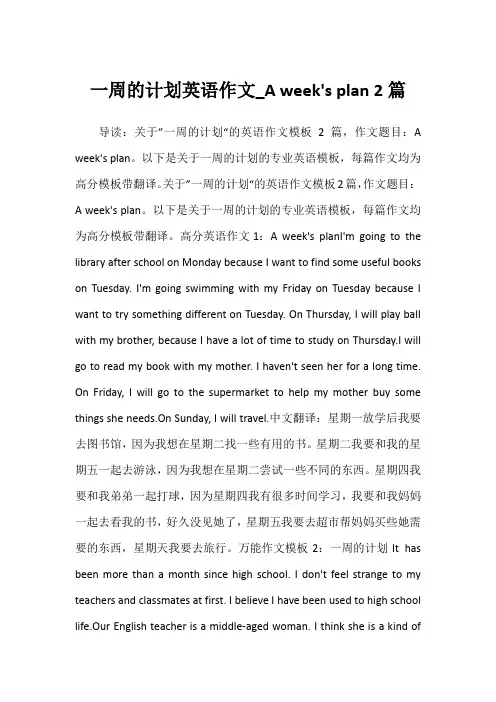
一周的计划英语作文_A week's plan 2篇导读:关于”一周的计划“的英语作文模板2篇,作文题目:A week's plan。
以下是关于一周的计划的专业英语模板,每篇作文均为高分模板带翻译。
关于”一周的计划“的英语作文模板2篇,作文题目:A week's plan。
以下是关于一周的计划的专业英语模板,每篇作文均为高分模板带翻译。
高分英语作文1:A week's planI'm going to the library after school on Monday because I want to find some useful books on Tuesday. I'm going swimming with my Friday on Tuesday because I want to try something different on Tuesday. On Thursday, I will play ball with my brother, because I have a lot of time to study on Thursday.I will go to read my book with my mother. I haven't seen her for a long time. On Friday, I will go to the supermarket to help my mother buy some things she needs.On Sunday, I will travel.中文翻译:星期一放学后我要去图书馆,因为我想在星期二找一些有用的书。
星期二我要和我的星期五一起去游泳,因为我想在星期二尝试一些不同的东西。
星期四我要和我弟弟一起打球,因为星期四我有很多时间学习,我要和我妈妈一起去看我的书,好久没见她了,星期五我要去超市帮妈妈买些她需要的东西,星期天我要去旅行。
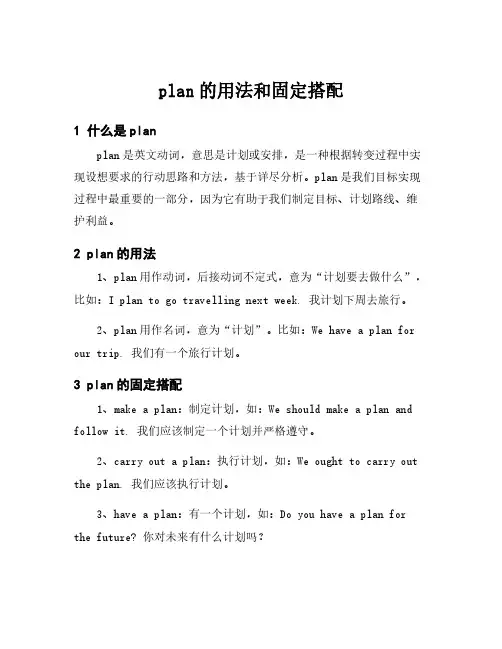
plan的用法和固定搭配
1什么是plan
plan是英文动词,意思是计划或安排,是一种根据转变过程中实现设想要求的行动思路和方法,基于详尽分析。
plan是我们目标实现过程中最重要的一部分,因为它有助于我们制定目标、计划路线、维护利益。
2plan的用法
1、plan用作动词,后接动词不定式,意为“计划要去做什么”,比如:I plan to go travelling next week.我计划下周去旅行。
2、plan用作名词,意为“计划”。
比如:We have a plan for our trip.我们有一个旅行计划。
3plan的固定搭配
1、make a plan:制定计划,如:We should make a plan and follow it.我们应该制定一个计划并严格遵守。
2、carry out a plan:执行计划,如:We ought to carry out the plan.我们应该执行计划。
3、have a plan:有一个计划,如:Do you have a plan for
the future?你对未来有什么计划吗?
4plan的另外用法
虽然plan主要用作动词和名词,但还接近于动词的使用,可以用在think about plan的形式,意为“筹划”,比如:We just need
to think about the plan.我们只需要考虑一下筹划。
总之,plan除了为我们制定目标,安排实施路线外,还可以指“筹划”。
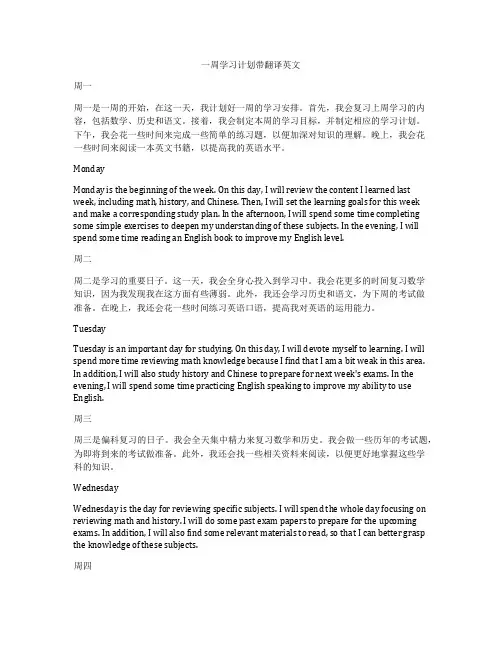
一周学习计划带翻译英文周一周一是一周的开始,在这一天,我计划好一周的学习安排。
首先,我会复习上周学习的内容,包括数学、历史和语文。
接着,我会制定本周的学习目标,并制定相应的学习计划。
下午,我会花一些时间来完成一些简单的练习题,以便加深对知识的理解。
晚上,我会花一些时间来阅读一本英文书籍,以提高我的英语水平。
MondayMonday is the beginning of the week. On this day, I will review the content I learned last week, including math, history, and Chinese. Then, I will set the learning goals for this week and make a corresponding study plan. In the afternoon, I will spend some time completing some simple exercises to deepen my understanding of these subjects. In the evening, I will spend some time reading an English book to improve my English level.周二周二是学习的重要日子。
这一天,我会全身心投入到学习中。
我会花更多的时间复习数学知识,因为我发现我在这方面有些薄弱。
此外,我还会学习历史和语文,为下周的考试做准备。
在晚上,我还会花一些时间练习英语口语,提高我对英语的运用能力。
TuesdayTuesday is an important day for studying. On this day, I will devote myself to learning. I will spend more time reviewing math knowledge because I find that I am a bit weak in this area. In addition, I will also study history and Chinese to prepare for next week's exams. In the evening, I will spend some time practicing English speaking to improve my ability to use English.周三周三是偏科复习的日子。

每周工作计划英文Creating a weekly work plan is essential for effective time management and productivity. 每周制定工作计划对于有效的时间管理和提高工作效率至关重要。
First and foremost, it is important to assess the tasks and prioritiesfor the upcoming week. 首要的是,重要的是评估下周的任务和优先事项。
This involves reviewing any ongoing projects, upcoming deadlines, meetings, and any other commitments that need to be factored into the plan. 这包括审查任何正在进行中的项目、即将到期的截止日期、会议以及需要纳入计划的其他任何安排。
Once the tasks and priorities are identified, it is crucial to allocate specific time slots for each task, taking into consideration the estimated amount of time each task will require. 一旦确定了任务和优先事项,就至关重要地为每个任务分配特定的时间段,考虑到每个任务所需的预估时间。
It is also important to be realistic about the amount of work that can be accomplished within a given time frame, and to avoid overloading the schedule. 同样重要的是要对在规定时间内所能完成的工作量抱有实际的态度,避免过度拥挤的日程安排。
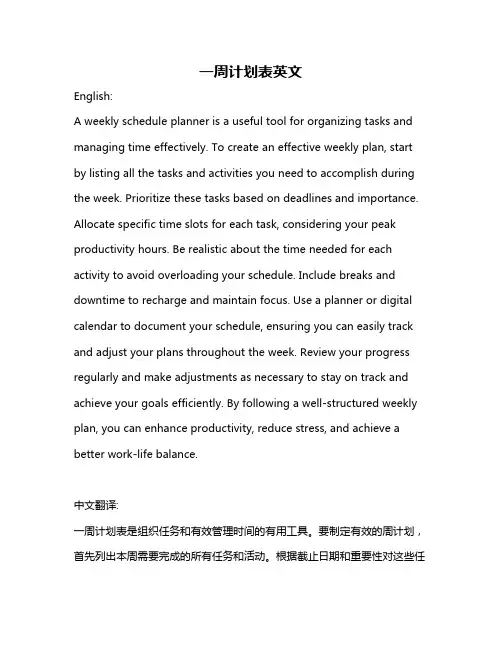
一周计划表英文English:A weekly schedule planner is a useful tool for organizing tasks and managing time effectively. To create an effective weekly plan, start by listing all the tasks and activities you need to accomplish during the week. Prioritize these tasks based on deadlines and importance. Allocate specific time slots for each task, considering your peak productivity hours. Be realistic about the time needed for each activity to avoid overloading your schedule. Include breaks and downtime to recharge and maintain focus. Use a planner or digital calendar to document your schedule, ensuring you can easily track and adjust your plans throughout the week. Review your progress regularly and make adjustments as necessary to stay on track and achieve your goals efficiently. By following a well-structured weekly plan, you can enhance productivity, reduce stress, and achieve a better work-life balance.中文翻译:一周计划表是组织任务和有效管理时间的有用工具。
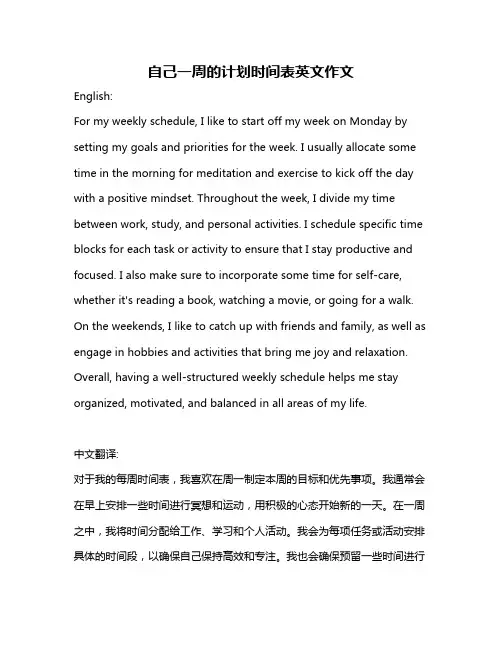
自己一周的计划时间表英文作文English:For my weekly schedule, I like to start off my week on Monday by setting my goals and priorities for the week. I usually allocate some time in the morning for meditation and exercise to kick off the day with a positive mindset. Throughout the week, I divide my time between work, study, and personal activities. I schedule specific time blocks for each task or activity to ensure that I stay productive and focused. I also make sure to incorporate some time for self-care, whether it's reading a book, watching a movie, or going for a walk. On the weekends, I like to catch up with friends and family, as well as engage in hobbies and activities that bring me joy and relaxation. Overall, having a well-structured weekly schedule helps me stay organized, motivated, and balanced in all areas of my life.中文翻译:对于我的每周时间表,我喜欢在周一制定本周的目标和优先事项。
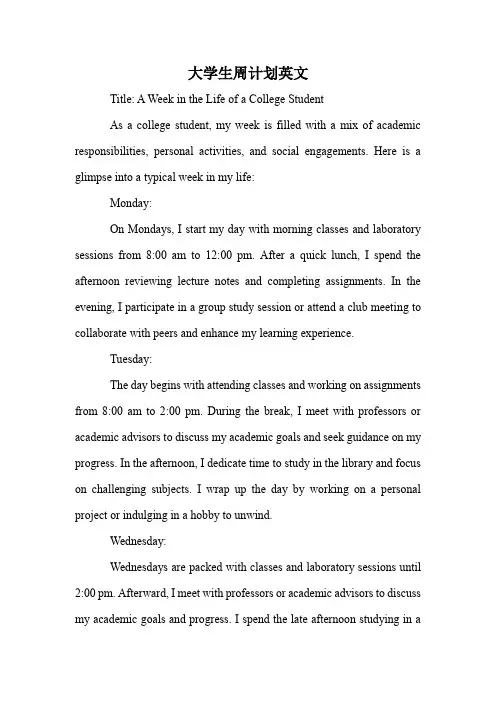
大学生周计划英文Title: A Week in the Life of a College StudentAs a college student, my week is filled with a mix of academic responsibilities, personal activities, and social engagements. Here is a glimpse into a typical week in my life:Monday:On Mondays, I start my day with morning classes and laboratory sessions from 8:00 am to 12:00 pm. After a quick lunch, I spend the afternoon reviewing lecture notes and completing assignments. In the evening, I participate in a group study session or attend a club meeting to collaborate with peers and enhance my learning experience.Tuesday:The day begins with attending classes and working on assignments from 8:00 am to 2:00 pm. During the break, I meet with professors or academic advisors to discuss my academic goals and seek guidance on my progress. In the afternoon, I dedicate time to study in the library and focus on challenging subjects. I wrap up the day by working on a personal project or indulging in a hobby to unwind.Wednesday:Wednesdays are packed with classes and laboratory sessions until 2:00 pm. Afterward, I meet with professors or academic advisors to discuss my academic goals and progress. I spend the late afternoon studying in aquiet space and attending a sports practice or club activity in the evening to stay active and socialize with peers.Thursday:The day kicks off with morning classes and completing assignments by noon. After a quick lunch break, I review lecture notes and work on group projects with fellow classmates. In the evening, I attend a career workshop or networking event to gain insights into potential career paths and build professional connections.Friday:Fridays are devoted to attending classes and studying for exams or working on assignments. I make time for exercise or physical activity to stay healthy and energized. In the evening, I enjoy dinner with friends or family to unwind and relax for the weekend.Weekend:On Saturdays, I dedicate time to reviewing lecture notes, studying for upcoming exams, and engaging in personal hobbies or outdoor activities. I attend club meetings or social events in the evening to connect with peers and build friendships. Sundays are for planning the week ahead, practicing self-care activities, and spending quality time with loved ones to recharge for the upcoming week.This weekly routine as a college student allows me to balance academic pursuits, personal growth, social interactions, and self-careactivities to lead a fulfilling and well-rounded life on campus.desire for peace and release from life's struggles.In our modern world, where we are constantly bombarded with distractions and demands, the question of "to be or not to be" takes on new significance. We are often swept up in the busyness of daily life, consumed by our responsibilities and obligations, and disconnected from our inner selves. In the midst of this chaos, it is essential to pause, reflect, and contemplate the deeper meaning of our existence.Ultimately, the question of "to be or not to be" invites us to engage in a profound exploration of our lives and choices. It challenges us to confront our fears, embrace our vulnerabilities, and seek meaning and purpose in a world filled with uncertainty and change. By embracing this existential inquiry, we can cultivate a deeper sense of self-awareness, resilience, and authenticity in our journey through life.In conclusion, the question of "to be or not to be" serves as a powerful reminder of the complexities and mysteries of human existence. It prompts us to reflect on the choices we make, the values we uphold, and the legacy we wish to leave behind. As we navigate the challenges and opportunities that come our way, may we find the courage and wisdom to choose "to be" in all its richness and complexity, embracing life in all its beauty and imperfection.。
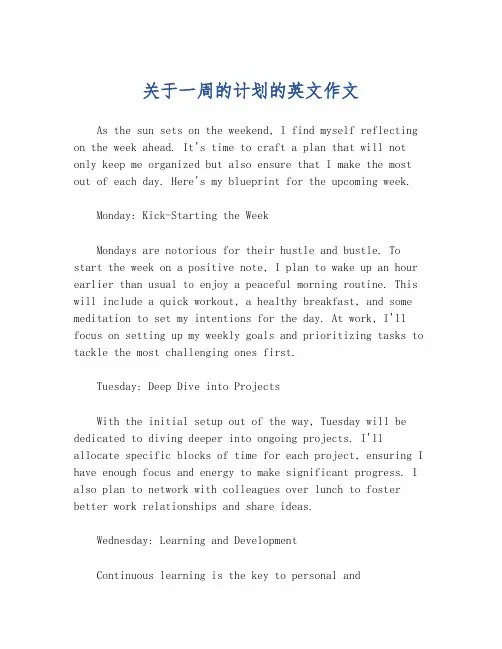
关于一周的计划的英文作文As the sun sets on the weekend, I find myself reflecting on the week ahead. It's time to craft a plan that will not only keep me organized but also ensure that I make the most out of each day. Here's my blueprint for the upcoming week.Monday: Kick-Starting the WeekMondays are notorious for their hustle and bustle. To start the week on a positive note, I plan to wake up an hour earlier than usual to enjoy a peaceful morning routine. This will include a quick workout, a healthy breakfast, and some meditation to set my intentions for the day. At work, I'll focus on setting up my weekly goals and prioritizing tasks to tackle the most challenging ones first.Tuesday: Deep Dive into ProjectsWith the initial setup out of the way, Tuesday will be dedicated to diving deeper into ongoing projects. I'll allocate specific blocks of time for each project, ensuring I have enough focus and energy to make significant progress. I also plan to network with colleagues over lunch to foster better work relationships and share ideas.Wednesday: Learning and DevelopmentContinuous learning is the key to personal andprofessional growth. On Wednesdays, I dedicate time tolearning something new, whether it's a new skill or staying updated with industry trends. This week, I'll be attending an online webinar on the latest digital marketing strategies.Thursday: Team Collaboration and ReviewThursday is all about collaboration and review. I'll be working closely with my team to review our progress, discuss any challenges, and brainstorm solutions. This day is alsoset aside for any necessary meetings and for providing and receiving feedback to improve our workflow.Friday: Wrap-Up and ReflectionAs the week draws to a close, Friday is dedicated to wrapping up any loose ends and preparing for the next week.I'll be reviewing my weekly goals to see what has been achieved and what still needs attention. This is also a dayfor reflection on the week's experiences and learnings.Saturday: Personal Errands and LeisureThe weekend is a time for relaxation and personal errands.I plan to run any necessary errands in the morning and then spend the afternoon engaging in a hobby I love, such as painting or playing a musical instrument.Sunday: Rest and Preparation for the New WeekTo ensure I'm ready for another productive week, Sundayis all about rest and preparation. I'll spend the day resting, perhaps catching up on a good book or a favorite TV series, and preparing my meal plan and to-do list for the next week.This week-long plan is designed to balance work, personal development, and relaxation. By setting clear goals and allocating time for each aspect of my life, I aim to have a fulfilling and successful week ahead.。
英文写一周计划作文Monday:On Monday, I plan to start my day by going for a morning jog. After that, I will spend the rest of the morning finishing up some work that I didn't get to last week. In the afternoon, I have a doctor's appointment, so I will be taking some time off work. Finally, in the evening, I plan to relax and catch up on some reading.Tuesday:Tuesday is going to be a busy day for me. I have a lot of work that needs to be done, so I will be spending most of the day at my desk. In the evening, I have a dinner date with some friends, which I'm really looking forward to.Wednesday:On Wednesday, I plan to take a break from work andspend the day exploring the city. I'll probably start by visiting a museum or art gallery, and then I'll spend some time walking around and exploring different neighborhoods. In the evening, I'll meet up with some friends for dinner and drinks.Thursday:Thursday is going to be another busy day for me. I have a lot of meetings and appointments scheduled throughout the day, so I'll be running around a lot. In the evening, I plan to go to a yoga class to unwind and relax.Friday:On Friday, I plan to finish up any work that I didn't get to earlier in the week. In the afternoon, I'll meet up with some friends for lunch and then spend some time running errands. In the evening, I'll probably watch a movie or catch up on some TV shows.Saturday:Saturday is going to be a fun day for me. I'm planning to go on a hike with some friends in the morning, and then we'll have a picnic lunch. In the afternoon, I'll probably spend some time working on a personal project, like writing or painting. In the evening, I'll go out with some friends for dinner and drinks.Sunday:On Sunday, I plan to take it easy and relax. I'll probably spend some time reading or watching movies in the morning. In the afternoon, I'll go for a walk or do some light exercise. Finally, in the evening, I'll prepare for the upcoming week by doing some meal prep and planning out my schedule.。
制定一个周计划英语作文英文版:Creating a weekly plan is an essential skill for managing time effectively and ensuring that you accomplish your goals. Here's a sample essay on how to create a weekly plan:Effective time management is crucial for success in both personal and professional spheres. Crafting a weekly plan is a proactive approach to organizing your time and tasks to achieve a balanced and productive life. Here's a step-by-step guide to creating a weekly plan that works for you.Step 1: Reflect on Your GoalsBegin by reflecting on your short-term and long-term goals. What do you want to achieve this week? Make a list of these goals to provide a clear direction for your planning.Step 2: Prioritize TasksOnce you have your goals, prioritize them based on urgency and importance. This will help you allocate your time and energy where it's most needed.Step 3: Break Down TasksBreak down larger tasks into smaller, manageable sub-tasks. This makes the tasks less daunting and easier to tackle.Step 4: Schedule Your TimeUsing a calendar or planner, allocate specific time slots for each task. Be realistic about how much time each taskwill take and include buffer times for unexpected interruptions.Step 5: Include DowntimeEnsure you schedule downtime for relaxation and self-care. This is essential for maintaining your well-being and preventing burnout.Step 6: Review and AdjustAt the end of each day or the beginning of the next,review your progress and make any necessary adjustments toyour plan. This helps you stay flexible and responsive to changes.Step 7: Stay ConsistentConsistency is key to the success of any plan. Stick to your schedule as much as possible, but remember to adapt when life happens.By following these steps, you can create a weekly planthat not only helps you stay organized but also ensures thatyou are making progress towards your goals.中文版:制定周计划是有效管理时间、确保实现目标的重要技能。
我的周计划英文作文5句话Last week, I made a detailed plan for my upcoming week. I believe that having a clear schedule can help me stay organized and make the most of my time. On Monday, I plan to start the week off strong by waking up early and going for a run to get my day started on the right foot. After that, I will spend some time reviewing my goals for the week and setting priorities for each day. 。
Tuesday will be a busy day for me as I have several important meetings and deadlines to meet. I will make sure to stay focused and productive throughout the day, taking short breaks to recharge and stay energized. In the evening, I will take some time for self-care and relaxation to unwind and prepare for the rest of the week.Wednesday will be dedicated to tackling any tasks that I may have fallen behind on earlier in the week. I will prioritize my to-do list and work efficiently to catch up on any outstanding work. I will also take some time to reflect on my progress so far and make any necessary adjustments to my plan for the rest of the week.Thursday will be a day for creativity and innovation. I will spend time brainstorming new ideas and strategies to improve my work and achieve my goals. I will also reach out to colleagues and mentors for feedback and advice to help me grow and develop professionally.Finally, on Friday, I will wrap up the week by reviewing my accomplishments and celebrating my successes. I will take some time to plan for the following week and set new goals to continue challenging myself and pushing towards excellence. I believe that by sticking to my plan and staying disciplined, I can make the most of each day and achieve great things in the long run.。
制定学习周计划英文IntroductionThe purpose of a study week plan is to organize and prioritize your time and resources in order to maximize your learning and achieve the best possible outcomes. By setting specific goals and developing a plan to reach them, you will be able to track your progress and make adjustments when necessary. A study week plan can be particularly helpful during times of intensive study, such as preparation for exams or completing a major project.In this plan, we will outline how to effectively allocate your time and energy during a study week. We will explore strategies for setting achievable goals, managing your time, and staying focused and motivated. By following this plan, you will be able to make the most of your study week and achieve your academic goals.Setting GoalsThe first step in developing a study week plan is to set clear and achievable goals. These goals should be specific, measurable, and attainable within the timeframe of the study week.A helpful framework for setting goals is the SMART criteria:Specific: Your goals should be well-defined and focused. For example, instead of setting a goal to "improve my grades," you might set a goal to "raise my grade in math from a B to an A-."Measurable: You should be able to track your progress and determine whether you have met your goal. This might involve setting specific targets, such as completing a certain number of practice problems or improving your test scores by a certain percentage.Achievable: Your goals should be realistic given your current level of knowledge and the time available for studying. Setting overly ambitious goals can lead to frustration and burnout.Relevant: Your goals should be directly related to your academic objectives and aligned with your overall learning strategy. For example, if your goal is to improve your study habits, you might set a goal to dedicate a specific amount of time each day to review and practice.Time-bound: You should set a deadline for achieving your goals. This will help you stay focused and prioritize your activities during the study week.Once you have established your goals, it is important to break them down into smaller, manageable tasks. This will make it easier to stay organized and track your progress. For example, if your goal is to raise your math grade, you might break this down into tasks such as reviewing past assignments, seeking help from a tutor, and completing practice problems. Managing Your TimeTime management is critical during a study week, as it can be easy to become overwhelmed by the amount of material to cover. To effectively manage your time, consider the following strategies:Create a study schedule: Outline the time available during the study week and allocate specific periods for studying, reviewing, and taking breaks. Be sure to also set aside time for relaxation and leisure activities to avoid burnout.Prioritize tasks: Identify the most important and time-sensitive tasks and focus on these first. This may involve reviewing the syllabus or assignment instructions to determine which tasks are most critical.Break tasks into smaller units: Large tasks can be daunting, so break them down into smaller, more manageable units. For example, instead of aiming to complete an entire chapter in one sitting, break this down into sections and set specific goals for each section.Use a planner or calendar: Write down your study week plan in a physical or digital planner, including specific tasks and deadlines. This will help you visualize your progress and stay on track.Avoid multitasking: Focus on one task at a time, rather than attempting to juggle multiple tasks simultaneously. This will help you stay focused and complete tasks more efficiently. Stay flexible: Be prepared to adjust your study week plan if unexpected events occur. This might involve reallocating time to address urgent tasks or extending deadlines as needed.Staying Focused and MotivatedMaintaining focus and motivation can be challenging, particularly during an intensive study week. To help stay focused and motivated, consider the following strategies:Set a positive mindset: Approach your study week with a positive attitude and confidence in your ability to achieve your goals. Remind yourself of past successes and the progress you have made.Eliminate distractions: Find a quiet, comfortable study environment free from distractions such as noise, clutter, and electronic devices. Consider using noise-canceling headphones or study apps to block out distractions.Take regular breaks: Schedule short breaks every 45-60 minutes to rest and recharge. Engage in physical activity, such as stretching or walking, during these breaks to increase energy and concentration.Monitor progress: Track your progress and celebrate small victories along the way. This might involve checking off completed tasks, reviewing improved test scores, or sharing accomplishments with a study buddy.Seek support: Reach out to professors, classmates, or friends for help and support when needed. Consider forming a study group to collaborate and stay motivated.Practice self-care: Prioritize your physical and mental well-being by getting enough sleep, eating nutritious meals, and engaging in activities that reduce stress and promote relaxation. ConclusionBy following the strategies outlined in this study week plan, you will be able to effectively allocate your time and resources to achieve your academic goals. Setting clear and achievable goals, managing your time, and staying focused and motivated are essential for success during a study week. By developing these skills and habits, you will be well-prepared to excel in your studies and meet future challenges with confidence.。
一周的学习计划英文Monday8:00 am - 9:00 am: Wake up and have breakfast9:00 am - 12:00 pm: Study for Calculus exam12:00 pm - 1:00 pm: Lunch break1:00 pm - 3:00 pm: Review notes for History presentation 3:00 pm - 5:00 pm: Work on English essay5:00 pm - 6:00 pm: Exercise6:00 pm - 7:00 pm: Dinner7:00 pm - 9:00 pm: Study for Chemistry testTuesday8:00 am - 9:00 am: Wake up and have breakfast9:00 am - 12:00 pm: Finish Chemistry test study12:00 pm - 1:00 pm: Lunch break1:00 pm - 3:00 pm: Work on History presentation3:00 pm - 5:00 pm: Practice Math problems5:00 pm - 6:00 pm: Exercise6:00 pm - 7:00 pm: Dinner7:00 pm - 9:00 pm: Review for English Literature test Wednesday8:00 am - 9:00 am: Wake up and have breakfast9:00 am - 12:00 pm: Take Chemistry test12:00 pm - 1:00 pm: Lunch break1:00 pm - 3:00 pm: Study for Economics quiz3:00 pm - 5:00 pm: Research for History presentation 5:00 pm - 6:00 pm: Exercise7:00 pm - 9:00 pm: Review for Math examThursday8:00 am - 9:00 am: Wake up and have breakfast9:00 am - 12:00 pm: Study for English Literature test 12:00 pm - 1:00 pm: Lunch break1:00 pm - 3:00 pm: Work on Economics quiz3:00 pm - 5:00 pm: Prepare for History presentation 5:00 pm - 6:00 pm: Exercise6:00 pm - 7:00 pm: Dinner7:00 pm - 9:00 pm: Study for Physics examFriday8:00 am - 9:00 am: Wake up and have breakfast9:00 am - 12:00 pm: Take Math exam12:00 pm - 1:00 pm: Lunch break1:00 pm - 3:00 pm: Review for Physics exam3:00 pm - 5:00 pm: Work on English essay5:00 pm - 6:00 pm: Exercise6:00 pm - 7:00 pm: Dinner7:00 pm - 9:00 pm: Relax and unwindSaturday9:00 am - 10:00 am: Wake up and have breakfast10:00 am - 12:00 pm: Review notes for upcoming week 12:00 pm - 1:00 pm: Lunch break1:00 pm - 3:00 pm: Study for upcoming tests and quizzes 3:00 pm - 5:00 pm: Work on assignments and projects6:00 pm - 7:00 pm: Dinner7:00 pm - 9:00 pm: Relax and unwindSunday9:00 am - 10:00 am: Wake up and have breakfast10:00 am - 12:00 pm: Review and plan for the upcoming week12:00 pm - 1:00 pm: Lunch break1:00 pm - 3:00 pm: Work on any pending assignments3:00 pm - 5:00 pm: Relax and unwind5:00 pm - 6:00 pm: Exercise6:00 pm - 7:00 pm: Dinner7:00 pm - 9:00 pm: Final preparations for the upcoming weekThis study plan includes a balance of studying for tests and quizzes, working on assignments and presentations, as well as time for relaxation and exercise. By following this plan, I hope to stay organized and effectively prepare for my upcoming academic challenges.。
关于一周的计划的英文作文English:This week, I have a plan to focus on improving my time management skills. I will start by creating a detailed schedule for each day, allocating specific blocks of time for different tasks and activities. I will also prioritize my tasks and set realistic goals for what I want to accomplish each day. In addition, I plan to limit distractions by setting specific times for checking emails and social media, and creating a designated workspace that is free from interruptions. I also want to incorporate regular breaks into my schedule to help maintain focus and prevent burnout. Finally, I will evaluate my progress at the end of each day and make necessary adjustments to my plan for the following days.中文翻译:这一周,我计划专注于提高我的时间管理能力。
首先,我将制定每天的详细日程安排,为不同的任务和活动安排具体的时间段。
我还将优先考虑我的任务,并为每天想要完成的目标设定实际可行的目标。